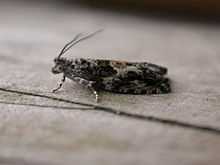Epinotia nisella
From Wikipedia, the free encyclopedia
| Epinotia nisella | |
|---|---|
 | |
 | |
| Scientific classification | |
| Kingdom: | Animalia |
| Phylum: | Arthropoda |
| Class: | Insecta |
| Order: | Lepidoptera |
| Family: | Tortricidae |
| Genus: | Epinotia |
| Species: | E. nisella |
| Binomial name | |
| Epinotia nisella (Clerck, 1759) | |
| Synonyms | |
| |
Epinotia nisella is a moth of the Tortricidae family. It is found in most of Europe (except Iceland, Portugal, Ukraine and the central part of the Balkan Peninsula), east to the Near East and the eastern part of the Palearctic ecozone. It is also found in North America, including Massachusetts and Minnesota in the United States. In Canada, it is found from Newfoundland to British Columbia.
The wingspan is about 12–17 mm. Adults are on wing from July to August.
The larvae feed on the catkins of various trees, including Salix, Alnus and Populus species. The larvae feed within the buds and then on the capsules before consuming the developing leaves.
External links
This article is issued from Wikipedia. The text is available under the Creative Commons Attribution/Share Alike; additional terms may apply for the media files.